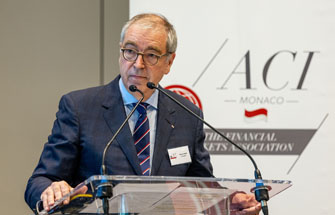
ACI Monaco, "The Financial Market Association", organises an annual conference on a topical subject. Last June, it welcomed Professor Christian GOLLIER, a Belgian economist who founded the Toulouse School of Economics with Jean Tirole (Nobel Prize) in 2007, and a specialist in environmental economics. Meeting with Robert LAURE, the President of the association.
How do you choose the themes for your conferences?
They are always based on current events. A few years ago, we chose the theme of Brexit. Last year we wanted to deal with the compliance aspect of Socially Responsible Investment, but unfortunately the conference could not be held. Then we had the privilege of being able to meet Christian GOLLIER, who renewed his agreement to lead "Investing for tomorrow's climate! "
It is a great pride for us to receive him, especially in the current context where we have seen a whole communication about the impact of the climate on the activity.
Is this a real subject, or just 'communication'?
Today, we are really in a situation where the risk of financial investment can no longer be looked at solely from an accounting perspective. A "summit" was organised on 27 and 28 May 2021 at the Toulouse School of Economics with Les Echos: "Saving the Common Good". Six Nobel Prize winners discussed with the best economists in the world the risks of the economy in general, not the direct financial risks, but the social risks, the risks of the great human balances. Christian GOLLIER was in charge of the issue of climate risk.
President of EAERE, the European Association of Environmental Economists, he demonstrated the importance of taking action in the face of climate change.
Apart from the risk aspect, what do you think about rating funds according to extra-financial criteria, the ESG criteria?
The approach is absolutely necessary, but it can be improved. We can no longer work without this observation tool. Today, in a construction phase, many criticisms are being made of these ratings because two elements need to be improved. On the one hand, the precise understanding of the rating methodology. On the other hand, the frequency and number of publications, which today are two elements that favour the quality of the rating. It's absurd, because you can be a bad student, a big polluter, but if you have communicated a lot, you might get a good mark. These are known blocking factors, on which teams are working. In particular with Professor GOLLIER, who is part of a committee of experts within EuroNext and the French monetary authorities on the definition of certain ESG indices.
In various interviews, Mr Jean Castellini, Minister Counsellor of the Department of Finance, mentioned the "greening" of the reserve fund to 100%, within a relatively short timeframe...
It is certainly achievable. The choice and duration of the path are the real issues.
A joint commission between government representatives and representatives of the AMAF was set up in Monaco on this subject. The first task assigned to this commission is to draw up an inventory of the situation in the Principality; so we are getting started.
Do you think that Green Finance can already have a place in the training courses given at the ACI?
Last year was a very unfavourable year because we could not provide the usual training courses. Next year, we are starting the cycle again. Firstly, what type of format will be used? Will it be face-to-face or distance learning? Probably a mix of both. We are working on the project of using digital technologies, while associating working groups that are a little more restricted, on very specific themes, in person. The second issue is our programme. We had introduced some new subjects, particularly on risks. This year, the conference on climate risk is already part of this continuity. We will necessarily extend the financial risk to the risk of green finance. And we are also thinking about a topic on communication.
The ICA is therefore a very dynamic association.
Today, it continues to exist, and it is still an association made up of individuals and not companies. The ACI only functions through the will of its members, that is to say, its members and then an office, a steering committee. It is important that our heads of establishments who have responsibilities not only towards their clients, their Board of Directors but also towards their employees, think of supporting this activity. It is up to us to convince them of the merits of this "investment".





